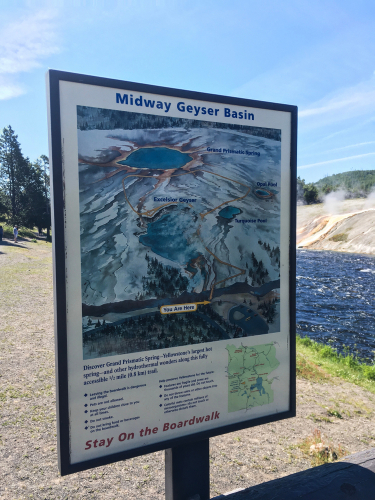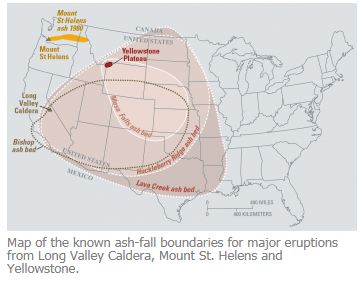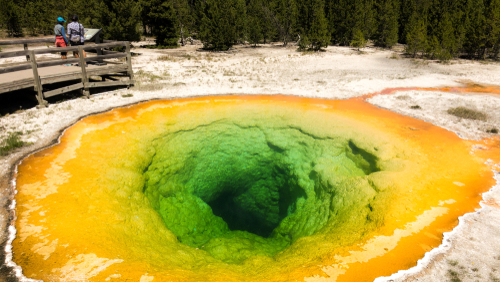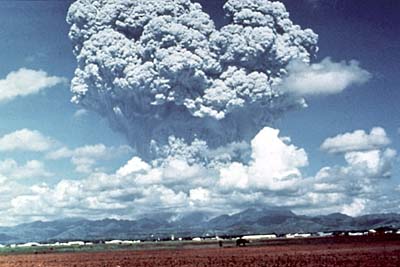Yellowstone – The Supervolcano When is It Due?
Yellowstone Supervolcano geyser Steamboat has been unusually active. Many fear that something strange is happening which may signal it is getting active once again under Yellowstone National Park. Steamboat is indeed the world’s largest geyser and it has erupted three times in just six weeks. Many people have been asking if we ran our models on this one. Sure, we gave it a reasonable shot. However, the data is way too vague to produce an accurate projection. This requires not just trying to ascertain the cycle in this Supervolcano, but to double check it against our entire database to see if it correlates with other events to increase the accuracy.
 Yellowstone National Park is actually an active supervolcano. It is a “supervolcano” since the entire park in inside the volcano, which is why you do not see the typical mountain and cone. As you walk around the park you do not realize that you are walking into the Yellowstone volcano’s Caldera. The Yellowstone Caldera was formed when the supervolcano erupted around 640,000+ years ago. The Yellowstone eruption area collapsed upon itself, creating a sunken giant crater or Caldera 1,500 square miles in area. You could fit Tokyo, the world’s biggest city, in Yellowstone’s super-volcanic Caldera, no less New York City, Los Angeles, London, and Paris.
Yellowstone National Park is actually an active supervolcano. It is a “supervolcano” since the entire park in inside the volcano, which is why you do not see the typical mountain and cone. As you walk around the park you do not realize that you are walking into the Yellowstone volcano’s Caldera. The Yellowstone Caldera was formed when the supervolcano erupted around 640,000+ years ago. The Yellowstone eruption area collapsed upon itself, creating a sunken giant crater or Caldera 1,500 square miles in area. You could fit Tokyo, the world’s biggest city, in Yellowstone’s super-volcanic Caldera, no less New York City, Los Angeles, London, and Paris.
What makes the place so beautiful is the dramatic geological chaos beneath the surface. The magmatic heat that powered that last eruption, is still there and actually is powered two previous eruptions. Therefore, the park’s famous geysers, hot springs, fumaroles, and mud pots, are all because what lies beneath is still very active.
 The very term “Supervolcano” implies an eruption of magnitude 8 on the Volcano Explosivity Index, indicating an eruption of more than 1,000 cubic kilometers (250 cubic miles) of magma. Yellowstone has had at least three such eruptions one about 2.1 million years ago, the next 1.2 million years ago, and the last big one 640,000 years ago. Three super-eruptions at Yellowstone appear to have occurred on a 600,000-700,000 year cycle. It is certain without question that a full-scale eruption would create a global disaster never witnessed by modern man. We are obviously at a loss of historical records to gauge what would happen. The most recent full-scale eruption took place 640,000 years ago – suggesting Yellowstone is overdue for an eruption. Yet this analysis is by itself just one-dimensional. To increase the accuracy, we need to correlate this with everything else in our database.
The very term “Supervolcano” implies an eruption of magnitude 8 on the Volcano Explosivity Index, indicating an eruption of more than 1,000 cubic kilometers (250 cubic miles) of magma. Yellowstone has had at least three such eruptions one about 2.1 million years ago, the next 1.2 million years ago, and the last big one 640,000 years ago. Three super-eruptions at Yellowstone appear to have occurred on a 600,000-700,000 year cycle. It is certain without question that a full-scale eruption would create a global disaster never witnessed by modern man. We are obviously at a loss of historical records to gauge what would happen. The most recent full-scale eruption took place 640,000 years ago – suggesting Yellowstone is overdue for an eruption. Yet this analysis is by itself just one-dimensional. To increase the accuracy, we need to correlate this with everything else in our database.
Looking at just the major Supervolcano eruptions does not help in really determining the true cyclical forces at work. We must also include the minor eruptions that take place within these cycles of 600-700,000 year intervals. The most recent volcanic activity consisted of rhyolitic lava flows which erupted approximately 70,000 years ago. Indeed, the most recent giant caldera-forming eruption, 640,000 years ago is a starting point. There have been approximately 80 relatively nonexplosive eruptions that have occurred in the past 640,000 years. On the surface, this yields a general cycle of 8,000 years. When we correlate that against the entire database we have, it amazingly lines up with 8,600 years, which is no surprise. When we extrapolate this with our VOLATILITY models, it appears that intensity builds in a cycle of 25,800 years (3 times 8.6).
1991 Pinatubo Eruption
 Looking deeper into these 80 eruption events, we discover that at least 27 were rhyolite lava flows in the Caldera, and 13 were rhyolite lava flows outside the Caldera. Some 40 eruption events were basalt vents outside the Caldera. Some of this “minor” eruptions that most people overlook were approximately the size of the devastating 1991 Pinatubo Eruption in the Philippines, and several were even much larger than that one. The most recent volcanic eruption at Yellowstone, a lava flow on the Pitchstone Plateau, occurred 70,000 years ago. So these minor events are entirely capable of even altering the climate WITHOUT the eruption of a Supervolcano which nobody can honestly say what would be the result. If the eruption of Mount Tambora in 1816 produced the year without a summer, this one would probably darken the sky for more than a year and would probably result in famine and starvation. The evidence of the previous ash-fall would cover the wheat fields of the USA. That would not be very good for society as a whole. How long would the sun be blocked is the real question. This would most certainly contribute to Global Cooling.
Looking deeper into these 80 eruption events, we discover that at least 27 were rhyolite lava flows in the Caldera, and 13 were rhyolite lava flows outside the Caldera. Some 40 eruption events were basalt vents outside the Caldera. Some of this “minor” eruptions that most people overlook were approximately the size of the devastating 1991 Pinatubo Eruption in the Philippines, and several were even much larger than that one. The most recent volcanic eruption at Yellowstone, a lava flow on the Pitchstone Plateau, occurred 70,000 years ago. So these minor events are entirely capable of even altering the climate WITHOUT the eruption of a Supervolcano which nobody can honestly say what would be the result. If the eruption of Mount Tambora in 1816 produced the year without a summer, this one would probably darken the sky for more than a year and would probably result in famine and starvation. The evidence of the previous ash-fall would cover the wheat fields of the USA. That would not be very good for society as a whole. How long would the sun be blocked is the real question. This would most certainly contribute to Global Cooling.
Over the past few decades, there have been several research papers in the scientific press that submit there is a correlation between cosmic-solar radiations and destructive geological events such as earthquakes and volcanic eruptions. On top of this, there are correlations with climate change that kick in where volcanoes throw up ash into the atmosphere which blocks the sun and that sets in motion the global cooling sending the earth back toward an Ice Age. Therefore, the entire process is extremely complex. Our computer can put out a forecast, but it is looking at everything and the dynamic complexity of all the interactions. This is why I do not put forth X happens because of Y. It is just more complex than such correlations.
Many put forth that we are overdue on the Supervolcano eruption using this measurement of 640,000 years ago for the previous event. What we will see is a series of building minor events that should probably come in clusters of three. Based upon our correlations, the Supervolcano will be due 670,800 years from the last event. That means, not so much that we are in the clear, but how accurate is that last date of 640,000 years ago? Is it +- 30,000 years? What does seem to be more likely is that a major event is building in intensity keeping in mind that the smaller events can still be bigger than Mount Tambora and on this scale, we do seem to be on schedule.


